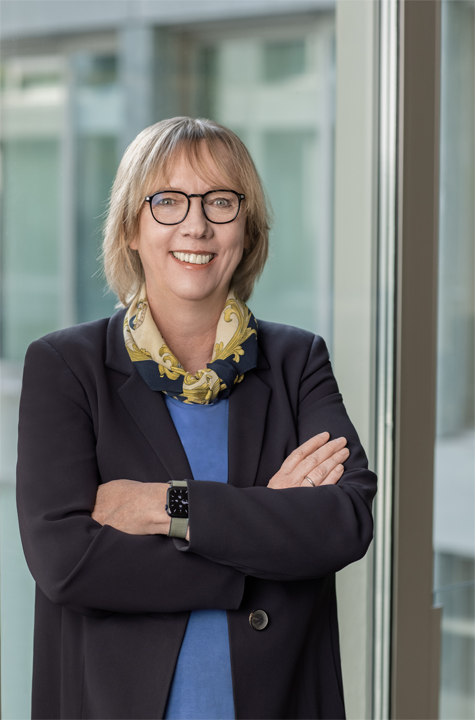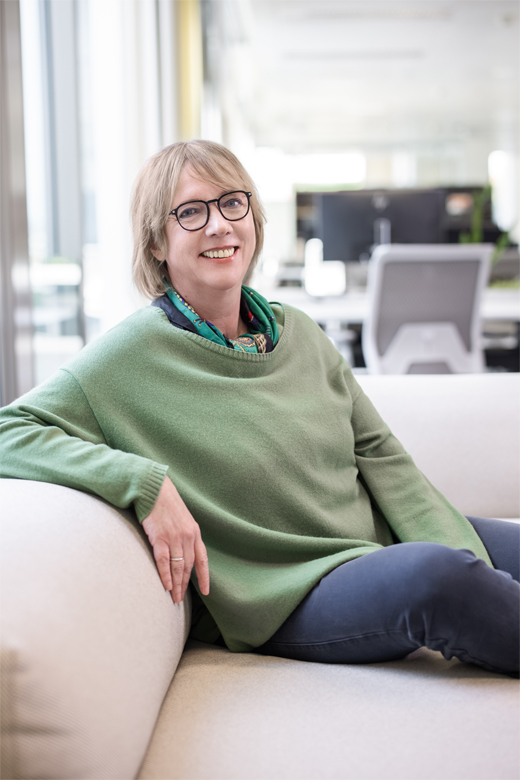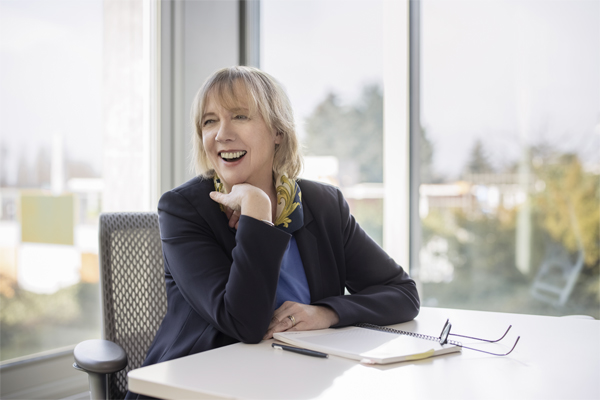Diversity champion and mathematician Silke Muenster partly attributes Philip Morris International’s (PMI) swift diversity, equity and inclusion (DE&I) success to analysis of the numbers and qualitative data; and a firm belief in “what gets measured gets done”.
Although she was promoted to Chief Diversity Officer (CDO) at the beginning of lockdown just last year, she has already accelerated PMI’s DE&I and wellbeing strategy to build a more inclusive and flexible culture; and made huge strides in closing the gender gap. In this interview, she explains how; and why education and data analysis are instrumental to ending inequality.
FAIR PLAY TALKS: Can you briefly tell us about your career journey to date and reasons for specialising in DE&I?
Silke Muenster: I am a German mathematician at heart. I started my career at Research International after earning my degree in mathematics from Ruhr University in Germany. From there I spent 20 years in market research, marketing and strategic planning roles for companies like Coca-Cola, Marbert Kosmetik and Apollinaris & Schweppes before joining PMI in 2011. At PMI, I led market research until the Chief Executive appointed me into the newly created role of Chief Diversity Officer in 2020 at the beginning of lockdown in Switzerland.
For much of my career I have actively supported DE&I initiatives and worked as a coach and mentor to other women. My passion has become wanting everybody to feel the joy of belonging to a community and a workforce. I want everybody to feel that they are celebrated individually for the characteristics that make them who they are; and the diverse thinking and opinions they bring to the table.
As a working mother, the feeling of being the only one in the room is not a strange feeling for me at all. It’s something I had to get used to over the many years that my children were growing up. I am accustomed to feeling I am different and at times in my career, I have felt unwelcome. This must change, and I want to play a part in driving this shift. I want inequality to end. The way women, people of color, and other underrepresented groups have been treated in the past and are being treated in the present must come to an end. We must create a better world for the next generations. I have a granddaughter who just turned one, and I really want her to have an easier path in her life.
FAIR PLAY TALKS: What’s the most rewarding part of your role?
Silke Muenster: For me, the most rewarding part of my job by far is when I hear how my team has inspired an employee or improved someone’s work life. In the end, this is why this role is so important. Everybody deserves to feel appreciated and celebrated for who they are.
I’m pleased to say that many businesses have realised how important inclusion and diversity is; both from a moral perspective and as a key driver of success. As business leaders, we have a responsibility to champion this not only within our own four walls, but also far beyond them.

FAIR PLAY TALKS: What is the most challenging part of your role?
Silke Muenster: The most challenging part of my role is convincing people that improving inclusion and diversity within PMI is everybody’s responsibility and that they have a role to play; it is not something I can solve on my own.
One of the big challenges is that people are not even aware of their unconscious biases. We’ve all heard a colleague exclaim, “I have no biases.” But that just isn’t true. Everybody has biases. I have biases – to a certain extent, our biases can help us make faster decisions. But many biases threaten to undo efforts to foster inclusive work environments, which is why we need to raise, acknowledge and address them.
Another problem is the “this is not my business” mindset; people who feel they don’t have to be engaged when it comes to racism or other forms of discrimination. We have to find a way to motivate every employee; making clear that we can only achieve lasting change when everybody is constructively participating.
Everybody has a role to play. That’s why we need to drive education and awareness. As Lieutenant General David Morrison, a senior officer in the Australian Army, said: “The standard you walk past is the standard you accept.”
FAIR PLAY TALKS: How has Covid-19 impacted your company’s DE&I/wellbeing strategy?
Silke Muenster: Covid-19 has had the impact of accelerating our strategy, rather than changing it. We – myself, the CEO at the time, and other senior leaders – were working to create and define the role of Chief Diversity Officer for several months prior, but, by coincidence, I was appointed on the first day of lockdown in Switzerland. It’s important to note that I report directly to the CEO, which demonstrates that PMI’s deep commitment to achieving inclusion and diversity comes from the top.
Since the moment I began, my team and I have been working tirelessly to fast track our strategy. For example, I’m excited to say we have nearly achieved our target of 40% of women in managerial roles by 2022; the current percentage is 38.4% of women in these roles.
With the majority of the company working from home for the past year and half, we have also accelerated our plan for hybrid working known as SMART WORK, which will give employees the option to choose a combination of remote and office-based work dependent on their location, role and job responsibilities. This working model underpins our commitment to building a more inclusive, flexible and people-centered corporate culture. We strive to be an attractive employer that is focused on supporting sustainable, high levels of performance by trusting our people and giving them the space to design their work in a way that works best for them.
Wellbeing – especially mental well-being – has moved into the focus even more during the pandemic. We measure the psychological well-being of employees regularly and analyse root causes and potential interventions. We are currently in the process of co-creating with employees our health and well-being framework to guide our future activities.
FAIR PLAY TALKS: Which diversity spectrums/aspects of DE&I are you focusing on the most in your current role and why?
Silke Muenster: With my background in market research, my process for tackling issues starts with analysing the root cause; looking at the numbers and the qualitative data. I’m also a firm believer in “what gets measured gets done.”
We are able to measure representation today – mainly on gender – but there is no gold standard out there on how to measure inclusion. I wanted to address that. There are some tools available. Some companies have developed their own – but none of them suited our needs. There’s not really a global benchmark, which would clearly help to drive progress. You want to compare yourself to others and say, “This level of inclusion is good enough” or, “We need to achieve more.”
So, we’ve started a yearlong research project with IMD [as reported]. One of the results will be to have a validated measure of inclusion, and a validated measure of what inclusion means today. Another question we want to answer is, “Did something change with this pandemic? Are there new facets that we also need to consider?” This is all part of our research project.
FAIR PLAY TALKS: How can organisations promote equality and fairness to enhance belonging and inclusion that will resonate with all groups?
Silke Muenster: We have a very different business environment today than we had just 10 years ago. Driving equality and fairness and enhancing belonging and inclusion is a business imperative for organisations today. A lot is (quite rightly) centred on innovation and consumer-centricity; and there are many more interdependencies – plus a great deal more uncertainty – around the way we work. This requires a completely different leadership style.
Today, it’s really important that leaders educate themselves. And they need to listen to their people and be curious. This combination is important. It’s not about asking the question and expecting a standard answer; but, rather, about being curious and trying to understand where people are.
We need leaders to create this environment of psychological safety, where people really feel they can speak up and can bring their best selves to work. In order to get there, we also need to show our vulnerabilities. We need to be open about our vulnerabilities; and even our failures. These are the basics, and they’re very important components in driving an inclusive environment.
Leaders also need to feel accountable for driving this agenda; at all levels of the organisation and at all levels of society. In the past, some leaders might have seen inclusion and diversity as “nice to have.” Now, they need to understand their role in driving inclusion and diversity. And we need to hold them accountable for the progress they achieve at all different levels.
FAIR PLAY TALKS: What learning have you personally gained through implementing DE&I/well-being policies in your company?
Silke Muenster: There is no silver bullet solution. Achieving an inclusive and diverse workforce means the effort and contribution of everybody. No matter how hard I try, I cannot solve this issue on my own. Everybody needs to feel accountable for this. It is my job to convey that sense of responsibility and put the accountabilities in place.
FAIR PLAY TALKS: Apart from being recognised as a Top 100 Diversity Officer, what’s been your biggest achievement to date in this role/profession?
Silke Muenster: Since being appointed as PMI’s CDO my team and I have achieved a lot in a short space of time, but we know that we still have a long way to go. To mention just two:
- Moving the dial on PMI’s gender gap. As I mentioned earlier, we have made a lot of progress on closing the gap, and I couldn’t be more proud or my colleagues at PMI for making this reality.
- Employee resource groups (ERGs). We recognise that there is more work to do to advance inclusion, improve our gender balance, and address ethnic and racial imbalances in our global leadership population. And we are continuing with this work through the creation of ERGs to further inclusion at PMI. So far, we have set up groups on:
- Race, ethnicity, and cultural diversity and inclusion (EMBRACE Global)
- LGBTQ+ inclusion (Global STRIPES)
- Gender inclusion (PMI’s Women’s Inspiration Network [WIN])
- Disability inclusion (PMI Able)
- Parents (plans are underway)
FAIR PLAY TALKS: Finally, what advice do you have for others aspiring to work in the DE&I/well-being field? And what are the top three must-have attributes to be a successful “diversity champion”?
Silke Muenster: The best advice I can give is recognising that every organisation is different and there are different reasons behind every company’s inclusion and diversity situation. This means that there is no “one size fits all” solution. The top three attributes, in my opinion, are:
- Determination
- Collaboration
- Patience/resilience

MORE ABOUT SILKE MUENSTER
Muenster was promoted to CDO at Philip Morris International (PMI) in March 2020, a newly-created role reporting directly to the CEO. She joined PMI in 2011, where she was director, Market and Consumer Research until 2012 when she became vice president, Market Research.
At PMI, she is known for being incredibly proactive on inclusion and diversity (I&D). She is a coach and mentor to other women; has built a women’s network at PMI and prior to her current role; and worked closely with senior leaders across the organisation on workplace strategies and tactics to advance I&D. Over the past months, she has successfully expanded the focus of the company’s I&D strategy and established a number of global Employee Resources Groups (including on gender, race and ethnicity, and LGBTQ+ inclusion) with the purpose of creating a space for community and connection among employees; and to foster a sense of belonging, visibility and greater understanding of different experiences and dimensions of diversity at PMI.
Prior to PMI, she spent 12 years in leading research roles at the Coca-Cola Company, four years at Apollinaris & Schweppes and four years at Marbert Kosmetik. She began her career at Research International after earning her degree in mathematics from Ruhr University, Bochum in Germany.
Silke Muenster was recognised as a Top 100 Diversity Officer this year. Click here to see the full list.




































